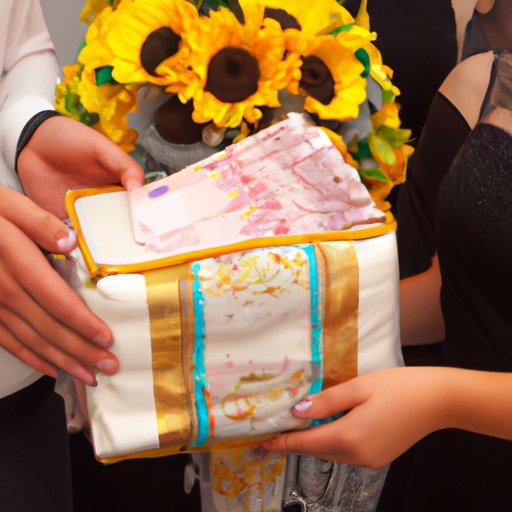
Introduction
Weddings are special occasions that bring joy, happiness, and love to the lives of couples. One of the age-old traditions that accompany weddings is giving gifts to the newlyweds. While some couples appreciate physical gifts, others prefer monetary presents. However, choosing the right amount of money to gift can be tricky. In this article, we will discuss how much money should be gifted at weddings, taking into account different factors such as relationships with the couple, cultural differences, and more.
Traditional Wedding Gift Amounts
Wedding gift customs differ across cultures and regions; still, some conventional rules of thumb exist. In some cultures, it is customary to gift an amount equivalent to the cost of the meal per person. In others, gifts are based on the couple’s economic status. In many western cultures, there is no set amount; however, giving a minimum of $50 to $100 per couple or per person attending is standard. It is essential to research the cultural and regional customs before deciding on a gift amount.
Relationship with the Couple
The relationship with the couple is another crucial factor when deciding on a gift amount. Depending on how close one is with the couple, the amount can vary significantly. For example, if the person is close family or a dear friend, they might want to go above and beyond the traditional amount. On the other hand, if the guest is a coworker or a distant relative, they might lean towards the lower end of the monetary value.
Budgeting for Wedding Gifts
Budgeting is essential when it comes to gift-giving. Weddings can be costly, and the gift shouldn’t break the bank. To avoid overspending, guests should budget their wedding gifts months in advance, setting aside a specific amount each month leading up to the big day. It is crucial to be mindful of what you can afford. The goal is to give a gift from the heart while not putting yourself in an uncomfortable financial situation.
Cost per Person Attending the Wedding
Calculating the cost per person attending the wedding is a helpful way to determine an appropriate gift amount. A guest’s gift should mirror the cost of the meal and other expenses such as travel and accommodations. This calculation can also be a baseline for how much one might give if they are unable to attend the wedding.
Couple’s Wedding Registry
The couple’s wedding registry is a gift-giving guide. Often, the couple includes specific items that they would like, and their registry can provide an option for physical and monetary gifts. A registry can help guests choose a gift based on their budget and the couple’s wishes. It’s essential to note that guests should never feel obligated to give a gift from the registry. A registry is only a suggestion, not a demand.
Venue and Couple’s Preferences
The venue and couple’s preferences can significantly impact gift-giving. If the couple is having a destination wedding or a lavish affair, guests may want to give a more substantial monetary gift. In contrast, if the wedding is a more intimate, relaxed setting, guests might opt for a lower monetary value gift. Keeping in mind the couple’s preferences and theme of the event can help guide gift-giving.
Meaningful Gift-Giving
While monetary gifts are always appreciated, sometimes a meaningful gift can touch the hearts of the couple more. Gifts that are thoughtfully chosen can be tailored to the couple’s personality and interests and will be cherished for a lifetime. Ideas for meaningful gifts include photo albums, personal hand-written letters, and even something as simple as a heartfelt toast.
Conclusion
Choosing the right amount of money to gift at a wedding can be challenging. By considering cultural customs, relationships with the couple, budgeting, cost per person attending, the couple’s wedding registry, venue and preferences, and meaningful gift-giving, the decision can become more manageable. At the end of the day, the goal is to give from the heart. We hope this article has given you a little more insight into the dos and don’ts of giving money at weddings.





